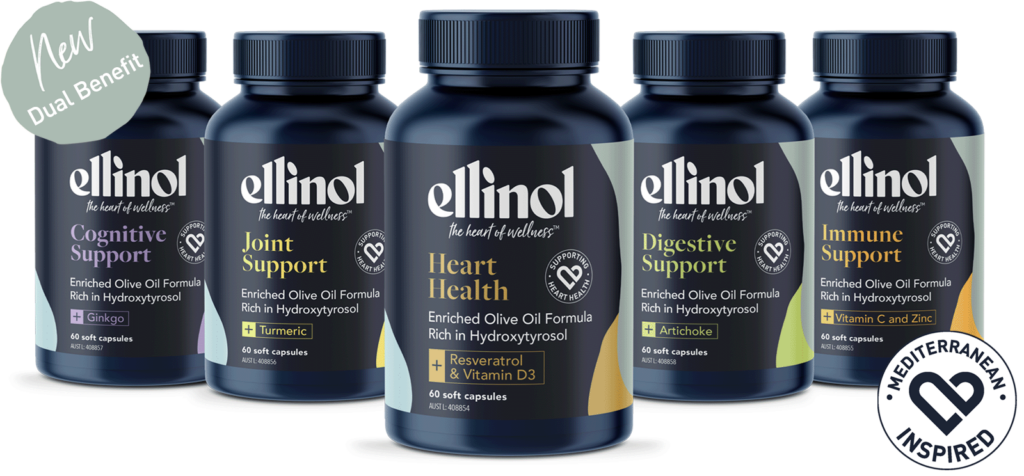
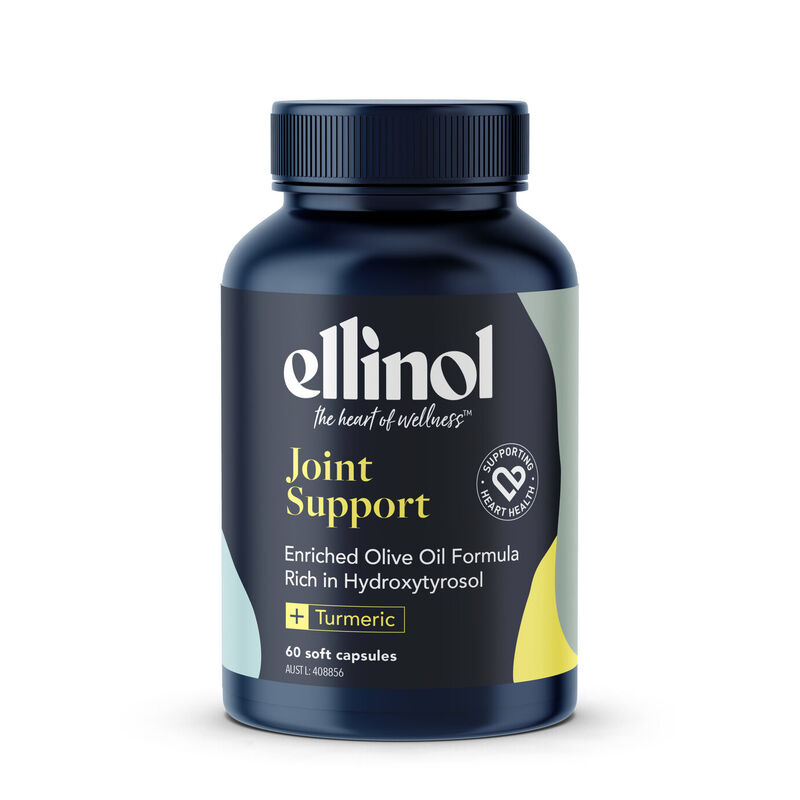
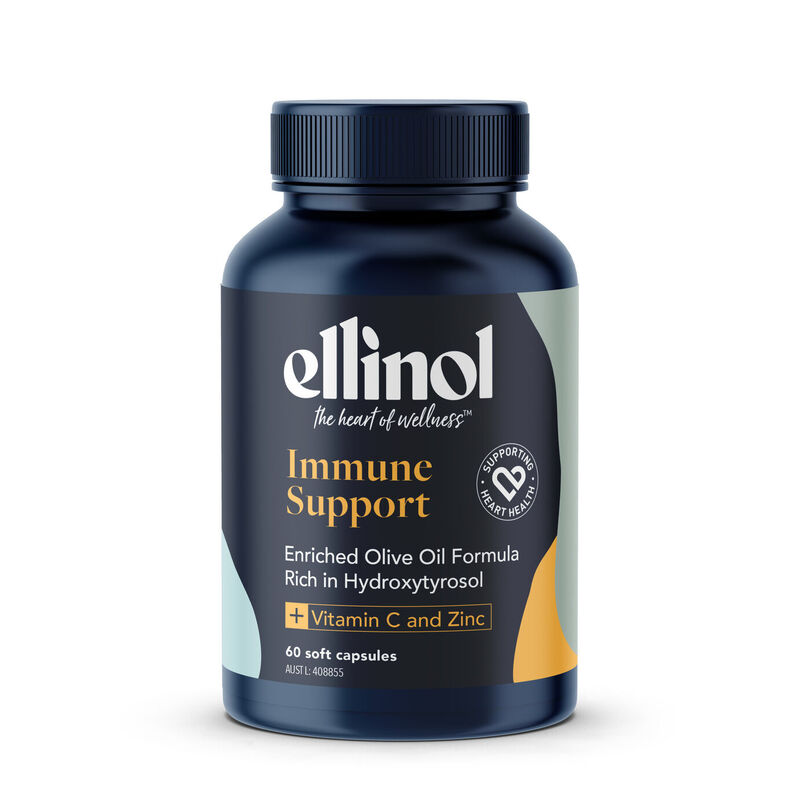


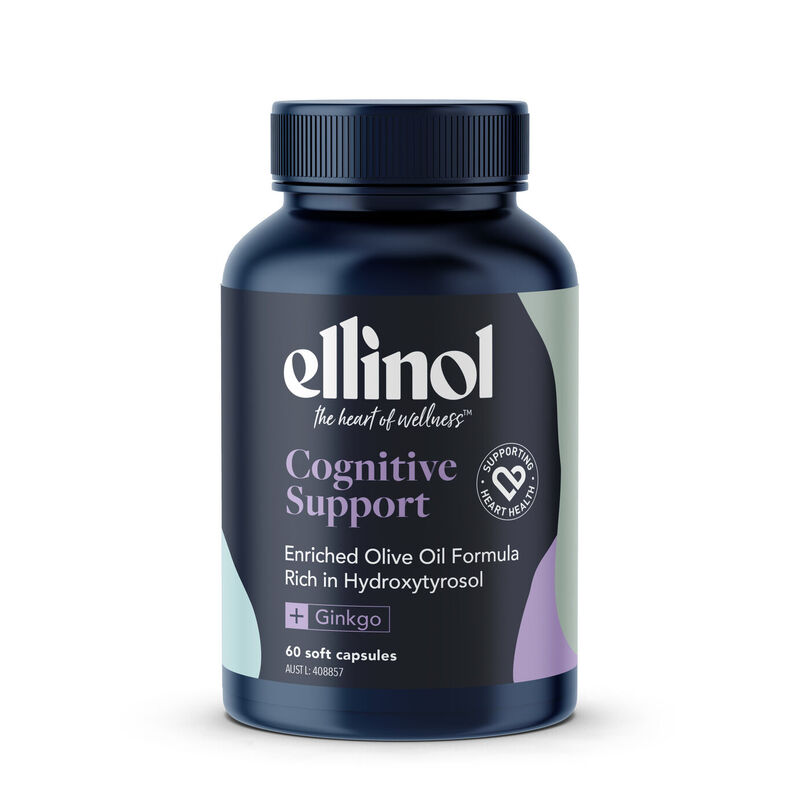

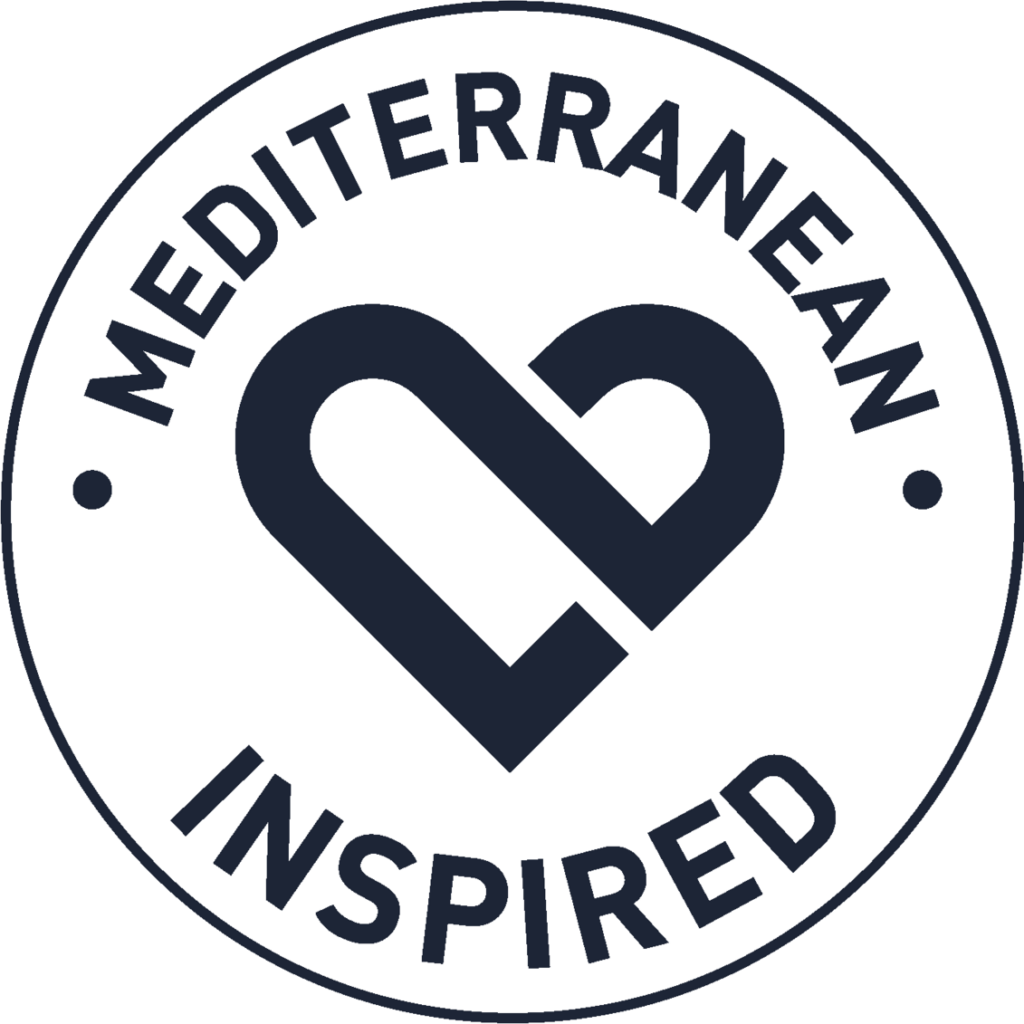
Why Ellinol
We believe that good health starts with good nutrition and we’re passionate about bringing the benefits of the Mediterranean diet to people all around the world.
Our modern lifestyle, characterized by sedentary behavior, poor dietary choices, and chronic stress, exposes us to significant health risks. Olive oil is recognized as a major contributor to a healthy diet and in combination with standardized hydroxytyrosol is at the heart of the wellness benefits supported by ellinol.
The ellinol range of health supplements concentrates the heart health and wellness benefits of the Mediterranean diet in a capsule containing Extra Virgin Olive Oil (EVOO), and enhanced with nature’s most powerful antioxidant hydroxytyrosol to promote cardiovascular health and long term well-being.
Our Extra Virgin olive oil, sourced from Greece’s Kalamata region, embodies the Mediterranean’s natural richness, remarkable health benefits and a natural source of monounsaturated fats and polyphenols.
Each ellinol product combines the unique EVOO & Hydroxytyrosol formulation with indication specific actives to support cardiovascular health and wellness, enhance brain function, support joint health, fortify the immune system, and nurture digestive wellness to cater to our diverse health needs and enhance long term vitality.
The Ellinol story is one of passion, dedication, and a commitment to promoting good health through the benefits of olive oil.
Ellinol, the heart of wellness.
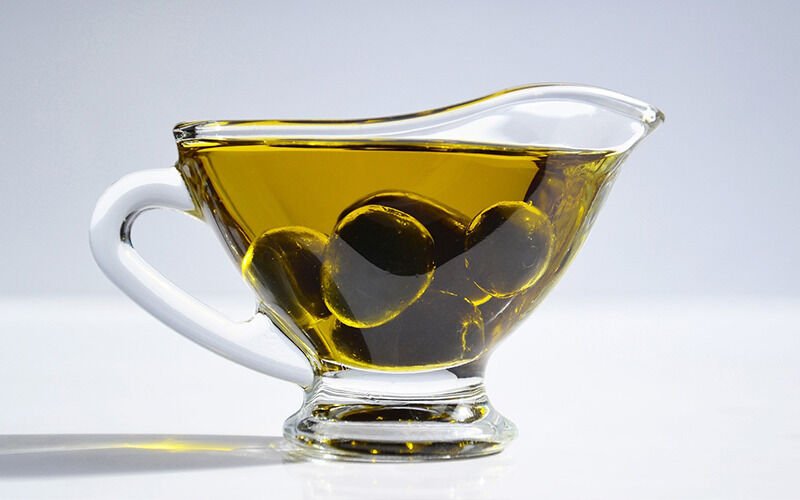
Why is Hydroxytyrosol a core ingredient in the ellinol range
Hydroxytyrosol is derived from Olive Oil, especially Extra Virgin Olive Oil (EVOO), and is it’s a key component of every ellinol capsule. This potent compound is part of the polyphenol family and is known for its powerful antioxidant properties. Key constituents of hydroxytyrosol include tyrosol, oleuropein, and oleocanthal. The cardiovascular health benefits of hydroxytyrosol include:
- Improved endothelial function, promoting healthy blood vessels.
- Reduction of inflammation in the cardiovascular system.
- Enhancement of overall blood flow and circulation.
- Protection against oxidative stress and damage.
Hydroxytyrosol has also been demonstrated to contribute to overall well-being and longevity by combating free radicals, reducing cellular oxidative stress and supporting healthy aging processes. Its antioxidant and anti-inflammatory effects also play a crucial role in maintaining overall health and promoting longevity.
Benefits of Olive Oil for Your Cardiovascular Health
In the heart-healthy Mediterranean diet, olive oil takes center stage as the primary source of fat. This ancient treasure has been linked to remarkable health outcomes, including higher cardiovascular resilience compared to other dietary choices. In fact, experts in the field have dubbed it “the standard in preventive medicine.”
Ellinol is a dietary supplement derived from olives that contains several polyphenols, including hydroxytyrosol, oleocanthal, and oleuropein. These polyphenols have been shown to provide a range of health benefits, including:
Hydroxytyrosol and oleuropein are powerful antioxidants that can help to protect cells from oxidative damage caused by free radicals. This can reduce the risk of heart disease.
Oleocanthal has been shown to have anti-inflammatory effects that may help to reduce inflammation in the body. This can be beneficial for individuals with inflammatory conditions.
A compelling study conducted in 2018 compared the occurrence of cardiovascular events among individuals who embraced a Mediterranean diet, incorporating either olive oil or nuts, as well as those who followed a low-fat diet. The findings were striking: Participants who adopted the Mediterranean diet, regardless of whether they consumed olive oil or nuts, experienced significantly higher cardiovascular resilience compared to those on the low-fat diet.
According to the authors of one 2018 review, the Food and Drug Administration (FDA) and the European Food Safety Authority recommend consuming around 20 grams (g) or two tablespoons (tbs) of extra virgin olive oil each day to reduce the risk of cardiovascular disease and inflammation.


Sustainability
Producing olive oil as a health supplement can indeed be considered more sustainable than producing fish oil, especially when considering factors like environmental impact, resource utilization, and ecosystem health. Here’s a detailed breakdown of why olive oil health supplements are generally more sustainable than fish oil supplements:
- Olive Oil: Olive trees are perennial, meaning they produce olives year after year without needing replanting. They also require less water and can thrive in relatively arid conditions. Olive trees have a longer lifespan, reducing the need for frequent replanting and soil disruption.
- Fish Oil: Fish populations are under immense pressure due to overfishing. Many marine ecosystems are at risk of collapsing due to excessive fishing practices, leading to reduced fish stocks, damage to biodiversity, and disruption of the food chain.
- Olive Oil: Olive tree cultivation is less likely to cause ecosystem destruction compared to fishing practices that often involve bycatch (accidentally catching non-target species) and damage to marine habitats from fishing equipment like trawling nets.
- Fish Oil: Commercial fishing can lead to overfishing, habitat destruction, and disruption of delicate marine ecosystems. It can harm not only the target species but also other marine life and the balance of ocean ecosystems.
- Olive Oil: Olive tree cultivation sequesters carbon dioxide from the atmosphere, helping mitigate climate change. The trees can provide shade and reduce soil erosion.
- Fish Oil: Fishing vessels, processing, and transportation of fish contribute significantly to carbon emissions. Additionally, the energy-intensive processes required to extract and refine fish oil can further increase the carbon footprint.
- Olive Oil: The production of olive oil generally involves less processing compared to fish oil extraction. Olive oil extraction methods, such as cold pressing, require less energy and generate fewer byproducts.
- Fish Oil: Extracting fish oil involves processing the fish, which can produce waste and byproducts that may pose environmental challenges if not managed properly.
- Olive Oil: Olives are a renewable resource, and olive trees can produce olives year after year, as long as they are properly maintained.
- Fish Oil: Fish populations are finite and can be depleted, making fish oil production less sustainable in the long term.
- Olive Oil: Mediterranean diets, rich in olive oil, have been associated with various health benefits, including cardiovascular health and cognitive well-being, making olive oil supplements a holistic choice.
- Fish Oil: While fish oil supplements are known for omega-3 fatty acids, relying solely on fish oil may overlook the potential benefits of other nutrients found in a diverse diet.
In conclusion, producing olive oil health supplements is generally more sustainable than fish oil supplements due to factors like resource management, ecosystem impact, carbon footprint, and overall environmental considerations. Choosing sustainably sourced and produced products, such as olive oil supplements, can contribute to both personal health and the health of the planet.

Heart Health
EVOO/Hydroytyrosol formulation plus Resveratrol & Vitamin D for enhanced cardiovascular & heart health
Read More
Cognitive Support
EVOO/Hydroxytyrosol formulation plus Gingko biloba for cardiovascular and cognitive health
Read More
Joint Support
EVOO/Hydroxytyrosol formulation plus turmeric for cardiovascular and joint support
Read More
Digestive Support
EVOO/Hydroxytyrosol formulation plus artichoke extract for cardiovascular and digestive support
Read More
Immune Support
EVOO/Hydroxytyrosol formulation plus Vitamin C and Zinc for cardiovascular amd immune support
Read MoreRead more
Health Claims from around the world
- An EU health claim for olive oil polyphenols Olive oil polyphenols contribute to the protection of blood lipids from oxidative stress https://efsa.onlinelibrary.wiley.com/doi/pdf/10.2903/j.efsa.2011.2033 FDA Completes Review of Qualified Health Claim Petition for Oleic Acid and the Risk of Coronary Heart Disease
- The US Food and Drug Administration (FDA) will allow a new “qualified health claim” to be placed on the labels of oils with high levels of oleic acid, a monounsaturated fat, stating that consumption of about 1.5 tablespoons (20 grams) of such oils may reduce the risk of coronary heart disease, the agency announced Monday. https://www.fda.gov/food/cfsan-constituent-updates/fda-completes-review-qualified-health-claim-petition-oleic-acid-and-risk-coronary-heart-disease
References
Hydroxytyrosol offers a myriad of health benefits across various domains:
- Recent studies have elucidated the biological effects of two isolated compounds, namely oleuropein and hydroxytyrosol, with particular attention on their antioxidant activity. Thus, a protective action has been demonstrated in preclinical studies against several diseases, especially cardiovascular and metabolic disorders. https://pubmed.ncbi.nlm.nih.gov/25086598/
- Cardiovascular Health: Hydroxytyrosol supports cardiovascular well-being by improving endothelial function, reducing inflammation, and promoting healthy blood flow https://www.ncbi.nlm.nih.gov/pmc/articles/PMC9966213/
- Joint Health: The anti-inflammatory properties of Hydroxytyrosol contribute to joint health by reducing inflammation, supporting cartilage health, and promoting joint function https://www.ncbi.nlm.nih.gov/pmc/articles/PMC6571782/
- Immune Health: Hydroxytyrosol exhibits immunomodulatory effects, enhancing immune function and fortifying immune. https://www.ncbi.nlm.nih.gov/pmc/articles/PMC8591503/
- Cognitive Health: Studies suggest that Hydroxytyrosol may possess neuroprotective properties, potentially aiding in the prevention of neurodegenerative diseases and supporting cognitive health. https://www.ncbi.nlm.nih.gov/pmc/articles/PMC6272603/
- Digestive Health: Hydroxytyrosol contributes to digestive wellness by preserving gut barrier integrity and modulating gut microbiota composition https://www.mdpi.com/2072-6643/15/7/1767
